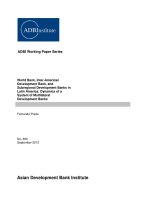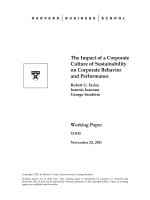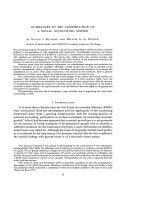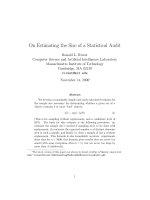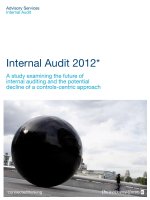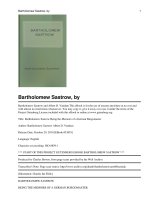memoirs of a banking-house
Bạn đang xem bản rút gọn của tài liệu. Xem và tải ngay bản đầy đủ của tài liệu tại đây (6.69 MB, 118 trang )
Cross
Coll.
Bus,Ad»Robert
E.
Gross
Colleftion
A
Memorial
to
the
Founder
of
the
^(H-Meec/
S/f'j'rf'rr/'it
Business
Administration
Library
l/w'versi/u
o^^
Va/^ot^nta
Los
Angeles
!JUtswii ani Engra.ve
d_ by
John iiay, ^
dinbin-^.
ih
MEMOIRS
BANKING-HOUSE
BY THE LATE
SIE
WILLIAM
FORBES OF PITSLIGO,
BABT.
AUTHOR
OF THE 'LIFE
OF DR
BEATl'IB.'
SECOND
EDITIOIT.
WILLIAM
AND
ROBERT
CHAMBERS,
LONDON
AND
EDINBURGH.
1860.
Edinburgh
:
Printed by
W.
and R.
Chambers.
Gross
Collection
Bus.
Adm.
Lib.
3
COG
INTRODDCTORY
NOTICE.
The public
is here presented with
a
Memoir, the
genuine
composi-
tion of Sir William Forbes,
regarding the history
of a mercantile
establishment, of which he was
long the chief The
manuscript
having been
accidentally
shewn to the
editor, he saw in it
so
much
that
was
interesting, as
to be
induced to
plead
with Sir William's
surviving
friends for
permission
to
place it before the
world. It
is consequently
published
at
the distance of fully fifty-six
years
from the
time
when
it was
written,
for the
author appears to have
closed
his
narration in May 1803.
The
private
banking-house
so
long known in Scotland
in
con-
nection
with the
name of
Sir
William Forbes—
merged since 1 838
in the
joint-stock
Union Bank of Scotland—had a
somewhat com-
plicated
genealog}^,
reaching far back in
the last
century—
the
century
of progress
in Scotland—and even
faintly gleaming
through
the
obscurities of
the one before
it, when
mercantile efforts and
speculations
were taking
their birth
amidst the
embers of scarcely
extinct
civil wars and
all
kinds of
private
barbarisms. The
genealogy
is
here
traced through a
firm
styled John
Coutts «fe Co.,
of
which the
principal member was
John Coutts,
lord-provost of
Edinburgh
in the years
1742 and 1743,
to Patrick
Coutts,
who
carried on
considerable
merchandise at
Montrose in
the
reign
of
William III.
The concern
is
shewn as
the main stock from
which
branched
off
the
eminent
London
banking firms
of Coutts
&
Co.,
Strand,
and
Herries
&
Co.,
St
James's
Street.
1557G34
11
INTRODUCTORY NOTICE.
Tlie earlier
part of the narrative exhibits banking In Its original
condition
as
a
graft upon
ordinary
merchandise. The
goldsmith,
the
corn-merchant, the commission agent,
were the first who
gave
bills of
exchange or discounted
private
notes
;
and such were
the
only bankers known even in
England till
near the close
of the
seventeenth
century. The house of John Coutts &
Co. was
entirely
of
this nature,
and it
had several
rivals
in Edinburgh.
It Is
curi-
ous to trace
the banking
part of their
business
as
rising, from a
subordination
to corn-dealing and other traffic,
to be
the principal,
and
finally
the
sole business, and to learn that the banker,
in
consequence of early connections, long continued
to
supply
distant
correspondents
with articles which would
now be
ordered
from
the family
grocer and oilman. It has strangely
come
about In our
own time, that
banking companies have, in some instances,
been
drawn once
more into
what might
be called merchandise, or
more
properly
mercantile speculation, in
consequence of
overgreat
advances
to private traffickers. But
of
this vice, which
we
have
lately
seen productive of such wide-spread
ruin, there was
little or
no
appearance during
a long
middle
period embraced by
this
Memoir.
And
here
lies,
as
the editor apprehends,
one
of
the
chief
points
of
interest
Involved In the present
volume.
It
depicts
a banking-house limiting its
transactions to its
own
proper
sphere
of business
—
^yielding once or twice to temptations
to do
otherwise,
and suffering from
It,
till at length It put
on
the fixed
resolution
to he a
banking-house only, and neither directly
nor
indirectly a mer-
cantile
speculator, and thriving accordingly. The Memoir is, how-
ever,
something more than
this,
for it exhibits a fine
example of
what prudence, care,
and diligence may
achieve with small means
in one of the
most exalted branches of commerce.
None of the
men concerned in
raising up
this
bank were rich, and we
have
details shewing us
that their transactions and
profits were at first
upon
a
very
limited scale. But the business
was
conducted on an
appropriate scale of
frugality
;
the simple
tradesman-virtues of
probity, civility, and attention to business were
sedulously
culti-
vated. All extravagance and needless risk
were avoided. The
firm was
accommodated
In
a
floor of the
President's
Stairs in the
Parliament Close, and
one
of the partners
seems
to have dwelt on
'
the premises.'
The whole
affair thus
reminding us not
a
little
of
INTRODUCTORY
NOTICE.
iii
those
modest out-of-the-way
banking-houses
on the
continent,
which we have
sometimes
such difficulty
in
iinding
when
we
are in search of change
for
a
circuhir
note.
These
unostentatious
merits, which
we see every
day raising
humble
traffickers
to
wealth and
eminence,
had precisely the same
cfToct in
the
case
of
this banking-house.
The
well-descended Sir William
tells
the
lesson Avith
great
simplicity and
candour, and it is one which
can
never be
repeated too
often.
The
Avriter
of
this Memoii*
was
bom in
1739,
heir to a
Nova
Scotia baronetcy,
Avhich his father held without
any means of sup-
porting it, beyond his exertions
as a member of the
Scottish bar.
Left fatherless
at four years of age, he owed much
in his
early
days
to an amiable
and
intelligent
mother, who
contrived to
maintain the style
and manners
of a lady on what
would
now
be
poverty
in
a much humbler
grade of life. His career as
a
banker,
from
an apprenticeship
entered upon at fifteen,
till he became
the
head
of an important house, and
recovered
all the fortunes
lost or
squandered
by former
generations of
his famil}', is
detailed
in the
work
now laid before the public, along with much of
the
analogous
progress
made by the country during the same
period.
It
remains
to
be
mentioned
that Sir
William, in
1770,
married a
daughter
of
Dr
James Hay of Hayston in Peeblesshire, and
became
the
ftither
of four
sons,
the eldest of
whom,
William,
who succeeded
him in the
baronetcy,
and died in
1828,
is
addressed in this Memoir;
the second,
John
Hay
Forbes,
became a
judge in
the Court
of
Session,
under
the
designation of
Lord
I^Iedwyn ;
the
third,
Mr
George
Forbes,
spent his
life as a
member of
the
banking-house
;
the
youngest,
Charles,
was an
officer
in the
navy.
Sir William, in 1
805,
presented
to
the
world a
life of
his friend
Dr
Bcattie, which
met a
favourable
reception,
not
merely as
an elegant
narration
of
the
biography of
an
eminent
man, but as
preserving
a
great amount
of
the
general
literary
history
of
the
country
which
must have
otherwise
perished.
He did
not
long
outlive
this effi)rt,
dying of water
in
the
chest in
November
1806,
at
the age
of
sixty-seven.
These
are
but
the
dry
bones of a
life distinguished
in an
extraordinary
degi-ee,
not
merely
by
energy and ability
in
professional
affairs,
but
by ceaseless
efforts of an enlightened
character
for
the
public
good, by
inexhaustible private
charity, by
ir
INTBODUCTORY
NOTICE.
high taste and
refinement,
and the
practice of
all
the active
virtues.
One would
need to have lived
through
the
last fifty
years in Scot-
land,
to be
fully
aware of
the
excellences
of
various kinds which
made
people speak with such veneration
of
Sir
"William
Forbes,
and
maintain
a
faith in his
modest private
bank
such
as is now
scarcely given to the joint-stock
of large
copartneries.
It
was but
participation in a universal feeling
which
caused
Scott to thus
refer to Sir
William, in addressing
one of the
cantos of
Marmion
to
the amiable banker's son-in-law
and
the
poet's
friend, Mr Skene
of
Rubislaw
:
*
Scarce
had lamented
Forbes
paid
The
tribute
to
his
Minstrel's
shade,
The tale of friendship
scarce
was
told,
Ere the narrator's
heart
was cold
—
Far
may
we search before
we find
A
heart
so manly and
so kind
!
But not around
his honoured
iu"n
Shall friends
alone and kindred
moiu'n
;
The thousand
eyes his care had
dried,
Pour at his name
a
bitter tide
;
And frequent
falls the
gratefiU dew,
For benefits
the world ne'er knew.
If mortal charity dare
claim
The
Almighty's
attributed
name.
Inscribe
above
his
mouldering clay,
"
The widow's shield, the orphan's stay."
Nor, though it wake thy sorrow, deem
My
verse intinides on this sad theme
;
For
sacred was the pen that
wi-ote,
"
Thy father's friend forget thou
not."
And
grateful title may I plead
For
many
a
kindly word and deed,
To bring
my
tribute to
his grave
:
—
'Tis httle—
but 'tis aU I have.'
And perhaps even a more
expressive
testimony is
given to
the
character of
Sir William
by
James
Boswell, when he makes
the
following statement in his Tour to
the Hebrides:
*
Mr Scott
came
to breakfast,
at which I introduced
to
Dr
Johnson
and him my
friend
Sir William Forbes,
now
of
Pitsligo, a man
of
whom
too
much good cannot be
said
; who,
with
distinguished
abilities and
application in
his
profession of a
banker,
is at
once a good com-
INTRODUCTORY
NOTICE.
V
panion
aiul
a
good
Christian,
which, I
think,
is
saying enough.
Yet
it
is
but
justice
to
record
that once,
when
he was
in a
danger-
ous
illness,
he
was
watched
with the
anxious
apprehension
of a
general
calamity
; day
and
night
his
house
was
beset
with
affec-
tionate
inquiries,
and
upon
his
recovery,
Te
Deim
was
the
universal
chorus
from
the
hearts
of
his
countrymen.'
R.
C.
AUTHOR
TO HIS
SON.]
Edinburgh,
1st January
1S03.
My DEAiiEST
William,
—
You have
often
heard
me express an intention
of writing
some account of
our house
of business in Edinburgh,
from its first
establishment
by the
Messrs Coutts.
The history of
a society
in which I
have passed the whole
of
my
time, from
my boyish
days to
this present hour, during
the
long
period of almost half
a century,
cannot but be very
interesting
to
me, especially since
by means of
my connection with
it, I
have
arrived, through the blessing
of Providence,
to a degree of
opulence
and
respectability of position,
which
I had very little
reason to look
for
on my first entrance
into the world. I
have often
thought
that such
a
narrative might not
be without its
advantage
to you,
as
calculated to
teach
you the necessity of
prudence and
caution in
business
of every kind,
but
most particularly in
that of
a
banker,
in Avhose possession
not
only his own
property,
but that
of
hundreds of others,
is
at stake
; and as shewing
you how, by
a
steady, well-concerted plan, with
a
strict
adherence
to
integrity
in all youi-
transactions, aided by civility,
yet without
meanness,
you can scarcely
fail, by
the blessing
of Heaven, to arrive
at
success.
From such a history, too, some
general knowledge
may be
gained of the
progressive improvement
of
Scotland.
For, although
it is no
doubt
true
that, even
where things
remain in
a good
measure
stationary
in a
country, the
business of a
banking-house,
the
longer it exists, has a
natural
tendency
to increase, when it
has been
conducted with prudence
and ability,
yet
it
is certainly
to
the rapid progress of
the
prosperity of this
country, that the
via
ADDRESS OF
THE AUTHOR TO HIS SOX.
very great
extension
of
the business
of
our house
during
the
last
twenty years
must, in a
great measure, be attributed. To
illus-
trate this
part
of
my proposed
sul)ject,
I have subjoined to my
narrative
a
short
and, I
must acknowledge,
a
very imperfect
sketch,
collected from
the best
authorities
I could
meet
ivith
; to
some of
which, my
situation as a
man
of business
has
given
me
peculiar access.
The
subject is
curious,
and to
me
extremely
interesting ; as
I have
lived in the
very
period when this improve-
ment of
our
native country
has assumed some form,
and seems
still to
be
making daily advances
to
yet greater prosperity
—
a
reflection
highly grateful to me as a
Scotsman.
To ray
own
memory this narrative will recall
many scenes on
which I
cannot look back
without the most heartfelt
gratitude to
that
Almighty
Being,
who has
been graciously pleased
to shower
down upon
me so
large
a
share of prosperity. Nor
can
I contem-
plate the many years
I have spent
in
business, and the number of
friends of
whom
death
has
in that interval deprived
me,
without
the most
serious
reflections on the rapidity with which this life is
wearing away,
and
the
propriety
of
my
bending
my
thoughts
towards
another—a
subject of
meditation at all
times proper
for
a
rational
being
;
but
peculiarly so for one who has lived so long
as
I have
done
in the hurry
and tumult of a constant intercourse
with
the busy
world—a
state
extremely unfavourable
to
sober
thought
and
reflection.
•
I
cannot
conclude this address to you, my dearest
AVilliam,
in
a
better
manner
than
by expressing
my
hope that this narrative will
confii-m you
in a love
for that profession which
you
probably
adopted at
first
on my suggestion. My wish certainly
was
to
insure
your
succession to
the fruits of my labours,
as far as I have
had
any
merit in
helping to raise the house to its present flourish-
ing
state.
If you
continue to pay the same attention to business
that
I
have
done
(I trust I may speak it in this place
without
vanity),
I
have
no
doubt that,
by
the
blessing
of Heaven
on your
endeavours,
you
may preserve
the
house
in
credit and respect-
ability
long
after
I shall
have paid my debt to
nature. But
I
never
can too
often nor
too
earnestly
inculcate that the continu-
ance of
that credit and
prosperity, under Providence,
must entirely
depend
on
yourself
If you prove yourself Avorthy
of
the notice of
your
father's
friends
(of
which I must do
you
the justice to say,
I
have
at this
moment the fairest
hope),
you
may
expect
their most
cordial
support, as
well
as a
continuance of that
favour
and
pre-
ference
with
which
they have
so long and
so steadily honoured
me. But if
your own
endeavours
be
wanting—
if
negligence take
ADDRESS OF THE AUTHOR
TO HIS
SON.
ix
the place
of attention to business, and
economy be
abandoned
for
profusion of
expense
—
you
may be assured
that the
concerns
of
the
house
will go
speedily
into decay, until at last that decline
shall
terminate in absolute
ruin. For, in
the
course of a long experience,
I can safely say
that I have
never known
a
single
instance in
which relaxed
management and
unbounded
expense
did not
end
in
total
bankruptcy.
That the
providence of the Almighty may
ever watch over
you
to
shield
you from
harm,
is the
earnest and
daily
prayer of.
My
dearest William,
Your fond and
affectionate
father,
William Forbes.
BANKING-HOUSE.
The founder
of the Edinburgh house
of
business
of
which I
am
now
to give some
account, was Patrick
Cmitts,
the
fourth
son of
Alexander Coutts,
provost
of Montrose,
whase
grandfather
is said
to have been
a
son of
the family
of Auchintowl,
and
to have
settled in
Montrose
in the end of the sixteenth
century.*
At
Avhat period
Mr Patrick Coutts
removed from
Montrose
to
Edinburgh I
have not learned But it
appears
by
his
books
of
accounts,
still in our
possession, that
he carried on
business
in
*
The
pedigree
of
Mr Coutts has been thiis stated to me by
a letter
from
Mr
Cliarles Thomson of
Montrose,
who had
it from Mrs Patison,
a
relative of
the family.
'
The first of the
family came
to Montrose
towards the end
of the
sixteenth
ccnturj'. He
is said to have been a son of
Coutts of
Auchintowl,
a
vassal
of the
family of Macdonald.
This gentleman
had a son, WiUiam,
who
was
provost of Montrose.
"William
was
succeeded by liis
son, Alexander,
who
lived to
a
great age, and left six sons and
three
daughters
: of the
sons,
William, the eldest, was also provost of
Montrose,
as was likewise
John, the second
son ; Hercules, the
tliird, settled in London
; Peter,
the
fourth, settled in
Edinburgh; Robert, the fifth,
went to America, and
died
there ;
James, the youngest,
Jilso
went to
America, but returned after some time,
and
purchased the
lands
of
Hallgrecn,
in the
shire of
Kincardine, and
was
also
provost of
Montrose. This gentleman was
the father of the
late Mr
Coutts
of
Hallgreen ;
and Provost
Coutts
of
Edinhuryh was the son of
Peter, the
fourth
son of
Alexander Coutts. I
shall only add that I
have had opportunity
to learn
that the
family have been
long and
universally respected in
Montrose
as
people
of very great
benevolence,
honour, and
integrity.' Of the
truth of tliis
last
assertion there
can be no better
proof than that
in three generations
four
of the
family were elected
chief
magistrate of their
native town.
2
MEMOIRS
OP
A
BANKING-HOUSE.
Edinburgh
as a
merchant
at
least
as early
as
the
year
1696.*
The books
are
kept in Scots money, and
very neatly and distinctly
written. He appears to have been a general
merchant, whose
transactions were considerably
extended,
for in his
books there
are
accounts of
mercantile
adventures to New York
and Pennsylvania,
to
Amsterdam, to France,
and to
the
Canaries.
He died in
the
autumn
of
1704
;
his will being dated 25th July
in
that year, and
an inventory of
his effects registered in the
books of
the sheriff
of
Edinburgh
on the
27th October thereafter.
By the latter he
appears to
have left of personal
estate somewhat better than
.£30,000
Scots, or
£2500
sterhng,
a
considerable
sum for
those
days. Mr
Patrick
Coutts was twice married. He left three
children—John, James, and
Christian
—
by
his first
wife, a
daughter
of the
family of Dunlop of Garnkirk,
in the county of
Lanark.
This
relationship gave rise to the intimate correspondence
which
always subsisted between the Messrs Coutts and the
Messrs
Dunlop and their
connections
in Glasgow. His second
wife
was
Rachel
Balfour,
as
appears from the
record of
the baptism of a
daughter named
Janet. After
the
death
of Mr
Patrick
Coutts,
his
children of the first marriage were sent to Montrose,
where
they lived
with an
uncle from the
year 1705 to
1719,
when the
eldest
son,
John, returned to Edinburgh. Mr John Coutts—
who
was
born
2Sth July
1G99
—
being
a
minor
when his father
died, I
presume
the business of
the latter had been in
a
great degree dis-
continued
by himself
before his death, and wound up by
the tutors
*
[In the
record of
the
Privy Council of Scotland, under date
July
3,
1694,
occurs
a
petition
from
Patrick
Coutts, merchant in Montrose,
who, acting for
himself and
partners,
had
bought
a
parcel
of serges
and worsted
stuffs
at
Leeds,
and had them
shipped
on
board a Swedish vessel bound for
Riga. The
vessel
was taken by a
French
privateer, and carried, with
all its cargo, into
Dunkirk.
Coutts
and his
partners
then
represented to the Privy Council
that it Avas cus-
tomary in such
cases to
send a
person to
Dunkirk, who
'might recover the
goods
for
a
small
price, as
being
English goods
prohibited
to
be
imported into
the
French
dominions
;
'
and
they
craved permission to send
'
ane honest
and
weel-affected
person
'
for that
purpose, due
security being given
'
that
he shall
behave
weel
and
honestly,
without
acting any thing
against their
majesties'
government.'
The
Council
gave
pemiission
to
Patrick himself
'
to
repair to
Dunkirk, for
recovering
the goods
mentioned,
and fi-om
thence to
undertake
and perfect
a
voyage
with the
goods to
any
port
within the
kingdom of
Scotland or
England,'
he
having first
taken the
oath
of
allegiance, and
given
security to the
extent
of
a
thousand
pounds
sterling,
that he
should not
consult or
contrive anything
against
the
government,
'
nor
carry any message
by
word or
write
in his going
to
or
coming
from France.'
These
precautions
bore reference to
the exiled
royal
family
residing at St
Ger-
mains,
and
to
the
constant traffic
carried on
with it
by
Jacobite gentlemen
of
Scotland.]
J'fiovosT
>f
f/»
C/Trofi:DL\m7?Gif.
1742.
/
MEMOIRS
OF
A
BANKING-HOUSE,
3
he left to his
children,
for it
does
not
appear that
he
had
any
partner by whom it might
have
been carried
on.
With
whom
or where Mr
John
Coutts served
an apprenticeship,
or
in what
year he
first
commenced
business
as
a
merchant,
I
do
not
know. From
some letters still
existing,
I find
him engaged
in
mercantile
concerns
in Edinburgh
in
the year
1723. But
most
of his
earliest
books
of accounts
are lost, and
his papers in much
confusion.
On the
23d of
September
1730,
he entered the
town-
council
of
Edinburgh
as first merchant
councillor. He married
a sister of
the late
Sir John
Stuart of AUanbank,
by whom he had
four
sons
—Patrick, John,
James, and Thomas.
At
one period
he
was
connected in
partnership with Mr
Haliburton
of Newmains,
in
Roxburghshire,* but
of the
commencement
or
termination
of
that
connection I
can find no trace. In the
year
1740,
1 find him
in partnership
with
Mr
Kobert
Ramsay, brother
of Sir Alexander
Ramsay
of Balmain;
from whom
he separated on the oth of Decem-
ber
1744, as
appears
by
an entry
in
his journal, declaring
that
their partnership
had terminated that
day, and that he was thence-
forward to caiTy
on business alone. Afterwards, however, he
assumed
as a
partner
Mr Archibald Trotter, who was Mrs Coutts's
first cousin,-|-
and had been in
the house of Charles and
Hugh
Smith
of Boulogne. Both the first mentioned partnerships were
under
the firm
of
John Coutts
&
Co.
;
but this had the title of
Coutts and Trotter.
Their
business was dealing in
corn, buying
and selling goods on commission, and the negotiation of
bills of
exchange on
London,
Holland, France, Italy,
Spain, and Portugal.
The negotiation of
bills
of exchange
formed at
that period
a considerable
part of
the business of
Edinburgh
;
for there
were
then
no country banks,
and consequently
the bills for the
exports and
imports of Perth, Dundee,
Montrose,
Aberdeen, and
other trading towns in Scotland,
with Holland,
France, and other
countries, were negotiated at Edinburgh. J I
see many
notices of
*
[Thomas
Haliburton,
of Newmains,
living about that time,
was, through
a
daughter,
great-grandfather to Sir
Walter Scott.]
f
[Jlr
Archibald Trotter was
the
second son of Alexander
Trotter of Castle-
sliiel, by Jean,
daughter of Sir Robert Stuart of
AUanbank.]
X
[In
both sections of this island, for a long period
after
public banks were
established,
the negotiating
of
bills of exchange
was in the hands
of private
merchants or
bankers.
'
The Bank [of
Scotland], at its
first erection, did deal
in
exchange,
but found it very
troublesome, unsafe, and
improper.
. .
. There
is no
place in
the trading world
but there are to be found
in it many that deal
in
exchange,
even in those cities
where
a
bank
is.
In
London there are a gi-eat
many,
and
those who
have
the
management of tlie Bank of
England
never,
that
I
have
heard of,
wished to rival them
in their
Ijusiness.
On
the
contrary, I
am
told
that they
help and accommodate
them
by discoimting of
biUs,
&c.'
—
Account
of
the
Bank
of
Scotland, lyi'intcd
about
1727.]
4
MEMOIRS OF A
BANKING-HOUSE.
the
difficulty, at
tliat
tiiTie,
of effecting
money
transactions of any
considerable
extent
in the
country towns of
Scotland
;
a sure
proof of the
utility
of
provincial banks, which,
when
properly
formed and judiciously conducted, are
of the
utmost
benefit
to the
trade of the kingdom,
and
have
been one great means, among
others, of the opulence
at
which
the country has arrived in the
course of the last century,*
as I
have more particularly
shewn
in
another place.
By the death
of
his
brother,
James
Coutts,
a
merchant
in Lon-
don, he succeeded to about
£20,000,
which was deemed
a large
fortune in those days ; and
being
a
man
of
high character
as a
merchant, as
well
as of very
popular and agreeable manners, he
lived with a degree of
hospitality
and
expense not usual in the
family of
a
merchant at that period. He
is reported to have
been
the
first lord provost of
Edinburgh who did the honours
of
the
city, by entertaining strangers in
his
own house ;
it
having
generally been the custom
that all
such entertainments were
given
in a tavern at the
city's
expense.
Unfortunately,
he was
thus
led into excesses
of
the table, and other indulgences,
which
at length hurt his constitution
; so
that,
falling into bad health,
he left the charge
of
the business of his
house and of his two
youngest sons—the
second
being
in Holland
—
to his partner, Mr
Trotter,
and,
taking
his eldest
son Patrick along
with him
as a
companion,
he set out for
Italy
on the 8th
August 1749.
A few
days
before his departure,
he executed a
new contract
of copart-
nery with
Mr
Trotter, in which the
partners
were
himself,
his
eldest son Patrick, and
Mr Trotter, under the
firm of Coutts,
Son, and
Trotter.
The stock
of
this
company was £4000
sterling.
He died at Nola, near Naples,
on the 23d March
1750,
at the
age of
fifty-one, beloved
and regretted by
all his
acquaintance,
who overlooked the imperfections
of his character
when
they
thought of him
as
the upright citizen
and useful
magistrate,
ever
zealous in the service
of
his friends,
and
a most agreeable member
of
society. I
give this character
of Provost Coutts
from
what
I
have
been told
by those who
were
of his
personal
acquaintance, for
I had not
myself
the opportunity
of knowing
him, as he was
dead
before I came to Edinburgh.
By the death
of Provost Coutts,
his
sons being all under
age,
the
executive part of the
business
devolved
*
[In
1803,
the three public
banks of Edinburgh
had
thirty-nine branches
tiiroughout the
country, and it is believed there were
very few
other provincial
banking establishments
then in existence.
The
Edinburgh
Almanac
for 1858
gives
a list of three hundred
and sixty-six branches
from
tlie
Edinburgh banks,
besides two banks in
Glasgow
and
six in the
other towns, liaving
a
hundred
and
ninety-five
branches.]
MEMOIRS
OP
A
BANKING-HOUSE,
5
on Mr Trotter.
After
a
few
)-ears,
however,
the
3'oung
gentlemen
and lie
not agreeing
together,
Mr
Trotter
resigned
his
share
in
the
company.
He,
I have
understood,
differed
widely
in
his
cliaracter
from
Provost
Coutts,
not
possessing
that liberality
of
thinking
and
acting in
business
for
which
the latter
was so greatly
distinguished.
The
young
gentlemen
seem
to
have considered
him
more
in
the
light
of
a governor
than
a partner
; and
as
neither
his
person
nor
manners
were at
all
calculated
to
command their
respect,
his
young
friends
were
constantly
teasing him
Avith little
boyish,
roguish
tricks.
One
that I
remember
hearing
of, Avhen
I entered
the
office,
consisted
in
their putting
a
live
mouse
under
the
cover
of
his
inkstand,
and watching
with glee
for the start
he was
to
give,
when,
on his lifting
the lid,
the
animal
jumped
out, to
the
no
small
amusement,
as
might
be expected,
of
the
whole
counting-
house.*
*
After
Mr Trotter
left the
copartnery,
he
tried
to establish
himself
in business
as an
accountant,
for which
he was ill qualified,
and as an
arbitrator
in mer-
cantile
disputes.
He
afterwards accepted
the rather ungracious
office
of agent
for
cei-tain
Edinburgh
banks in theii* warfare
with those of Glasgow,
to wliich
place
he occasionally
repaired
to make demands
for gold. At times
he was
subject
to
a species of religious
melancholy, which he
inherited from his
mother,
the
Lady
Castleshiels of
the
Allanbank
family—
by
whom
he was related
to the
Messrs
Coutts. Slie had
composed a most extraordinary Book
of
Meditations,
whicli
her
son published some little time before his
death. He
at
last
retired
from
all
business, and resided
at an estate in the neighbourhood
of Edinburgli,
which
he obtained by his wife.
[The warfare
hei-e alluded to
by Sir 'William
was of a peculiar
character. The
Royal Bank of Scotland, from
its commencement,
in
1727,
had been favoured
and
supported by the merchants
of Glasgow. There was
a
great deal
of angry
rivali-y between that establishment
and its senior, the Bank of Scotland, whicli
had
considered itself
extremely ill-used by
the
government
of George I., when
the
Royal Bank
obtained its charter.
The bad blood found expression
in pro-
ceedings which no
Scottish bank would
now dream of condescending
to, but
which
were
then considered quite legitimate
; at least they were very common.
The
banks
would hoard
up a quantity of each other's notes,
and
endeavour,
by
presenting
them suddenly, to create embarrassment.
To
counteract the bias
of
the Glasgow
merchants for the Royal Bank, the Bank of Scotland took part, in
1749,
in
establishing what was afterwards kno-wn as the Old Bank in the western
city.
As a
protective or retaliatory measure, the
Royal
Bank
helped next
j'car
in
setting up
the New Banking Company
at
Glasgow. From the papers connected
with
the case
'
Aixhibald Trotter
v.
Andrew Cochrane,
John Murdoch
& Co.,'
it
appears
that, some years afterwards, the
Edinburgh
banks became
sensible
of
a
common injury fi'oni these western
establishments, and
laid aside tlieir
old
animosities
in order
to
get them, if
possible, put down.
Tlicy concurred
in
calling
upon the Glasgow merchants to
give
up
the
trade
of
banking, under tlie
pain of
having
their
credits
withdrawn. This was refused,
and then
it
was tliat
Mr
Trotter, in order to further the
objects of the
Edinburgh banks and
distress
the
west country bankers, took up his
residence in
Glasgow.
'
Mr
Trotter certainly made
a
practice
of
receiving, or
rather of collecting the
notes,
of
Murdoch
& Co., and
demanding payment
of large smns in cash; and
